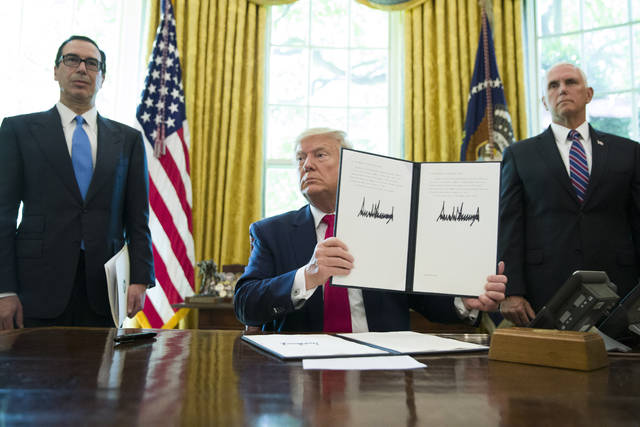https://naviga.triblive.com/opinion/pat-buchanan-can-trump-still-avoid-war-with-iran/
Pat Buchanan: Can Trump still avoid war with Iran?

President Trump does not want war with Iran. America does not want war with Iran. Even the Senate Republicans are advising against military action in response to that attack on Saudi Arabia’s oil facilities.
If neither America nor Iran wants war, what has brought us to the brink?
Answer: The policy imposed by Trump, Pompeo and John Bolton after our unilateral withdrawal from the Iran nuclear deal.
Our course was fixed by the policy we chose to pursue.
Imposing on Iran the most severe sanctions ever by one modern nation on another, short of war, the U.S., through “maximum pressure,” sought to break the Iranian regime and bend it to America’s will.
Submit to U.S. demands, we told Tehran, or watch your economy crumble and collapse and your people rise up in revolt and overthrow your regime.
Among the 12 demands issued by Pompeo:
End all enrichment of uranium or processing of plutonium. Halt all testing of ballistic missiles. Cut off Hezbollah in Lebanon and Hamas in Gaza. Disarm and demobilize Shiite militias in Syria and Iraq. Terminate support for the Houthi rebels resisting Saudi intervention in Yemen.
The demands Pompeo made were those that victorious nations impose upon the defeated or defenseless. Pompeo’s problem: Iran was neither.
Hezbollah is dominant in Lebanon. Along with Russia and Hezbollah, Iran and its militias enabled Bashar Assad to emerge victorious in an eight-year Syrian civil war. And the scores of thousands of Iranian-trained and -allied Shiite militia fighters in the Popular Mobilization Forces in Iraq outnumber the 5,200 U.S. troops there 20 times over.
Hence Tehran’s defiant answer to Pompeo’s 12 demands:
We will not capitulate, and if your sanctions prevent our oil from reaching our traditional buyers, we will prevent the oil of your Sunni allies from getting out of the Persian Gulf.
Hence, this summer, we saw tankers sabotaged and seized in the Gulf, insurance rates for tanker traffic surge, Iran shoot down a $130 million U.S. Predator drone, and an attack on Saudi oil production facilities that cut Riyadh’s exports in half.
This has been followed by an Iranian warning that a Saudi attack on Iran means war, and a U.S. attack will be met with a counterattack. We don’t want war, the Iranians are saying, but if the alternative is to choke to death under U.S. sanctions, we will use our weapons to fight yours.
America might emerge victorious in such a war, but the cost could be calamitous, imperiling that fifth of the world’s oil that traverses the Strait of Hormuz, and causing a global recession.
A fundamental question arises: If the United States was not attacked, why is it our duty to respond militarily to an attack on Saudi Arabia?
Saudi Arabia is not a member of NATO. It is not a treaty ally. The Middle East Security Alliance or “Arab NATO” chatted up a year ago to contain Iran — of Egypt, Jordan, Saudi Arabia and the Arab Gulf states — was stillborn. We are under no obligation to fight the Saudis’ war.
Nor is Saudi Arabia a natural American ally.
The question President Trump confronts today:
How does he get his country back off the limb he climbed out on while listening to the Republican neocons and hawks he defeated in 2016, but who have had an inordinate influence over his foreign policy?
Copyright ©2026— Trib Total Media, LLC (TribLIVE.com)
